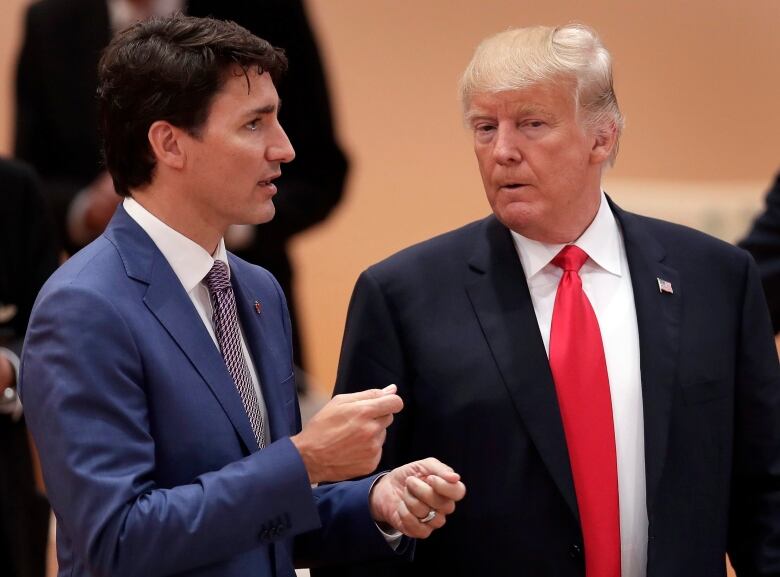Trudeau's challenge will be turning foreign fanfare into actual influence
Trudeau has the attention of an international audience. The question is what he will do with it

During his speech to Congress and the nation after the Sept. 11 attacks, U.S. President George W. Bush made a point of individually thanking many countries for their responses to the tragedy. He specifically named Britain, France, Germany, South Korea, Egypt, Israel, Iran, Japan, Pakistan and even El Salvador. He also thanked the entire continents of Australia and Africa, and gratefully acknowledged Latin America. Yet there was one country that noticeably failed to a get a mention: Canada.
To be so publicly overlooked by the leader of the free world — our neighbour — was not only embarrassing, it also felt like a referendum on our global significance. But many things have changed since that speech was delivered almost 16 years ago, the most significant of which is that for the first time in many of our lives, the U.S. president is no longer the leader of the free world. And Canada (yes, us: sorry Angela Merkel), led by Justin Trudeau, seems to be gunning to take over that mantle.
Trump's abdication
If you still believe that America, by default, must occupy that position, you haven't been paying attention. The U.S. president is supposed to be at the forefront of defending freedom and democracy throughout the globe. But virtually since the day he occupied the office, Donald Trump has been drowning in scandal: an unprecedented constitutional crisis, a hacked election mess and the threat of impeachment looming over his head. Beyond that, he has verbally attacked his allies, while appearing to side with Russia, a country that many Republicans considered a global threat and an enemy of freedom not all that long ago.
Trump is less the leader of the free world than he is a global joke. He is now the most unpopular president in American history at home and abroad, and he will certainly not be the one unilaterally dictating geopolitical strategy to French President Emmanuel Macron, or German Chancellor Angela Merkel, or Canada's Justin Trudeau.

Therein lies the opportunity for Canada. Foreign Affairs Minister Chrystia Freeland's recent foreign policy speech — which included some not-so-subtle shading of Trump's White House — was not simply a statement about defending global democracy: it was an announcement that Canada's government will be on the front lines.
Defence Minister Harjit Sajjan's subsequent defence policy review announcement bolstered that signal, offering new military spending to fortify Canada's military might, perhaps suggesting a greater role for Canada in fighting overseas conflicts along with allied nations.
Foreign fanfare
Meanwhile, Trudeau is very much getting himself noticed on the world's stage: with NATO socks, international magazine covers and cosy meet-and-greets with world leaders, past and present, among other tactics.
Many people — CBC columnists, included — dismiss these antics as little more than political gimmicks. But these moves are actually part of a deliberate global PR campaign aimed at informing the world that Trudeau's government is here, and it shouldn't be overlooked as it has been in the past.
For the first time in our lives, global political branding can be done at the push of a single button. Once upon a time, world leaders needed official state visits to introduce themselves and their platforms to foreign citizens. Now, all of that can be achieved in a tweet, as Trudeau has demonstrated rather well.
Granted, in terms of tangible achievements, Trudeau hasn't actually done all that much — yet. He's negotiated a few small victories: a reported exemption to the U.S. steel requirement for the Keystone XL pipeline, an alliance with the new Irish prime minister to push ahead with the Comprehensive Economic and Trade Agreement (CETA) and he's managed to get Trump to back down on tearing up NAFTA — at least for now.
That said, he's still grappling with plenty of issues at home: reconciliation with Canada's Indigenous peoples, the controversial settlement with Omar Khadr, ballooning spending projections and so forth. These issues haven't yet derailed his international acclaim, but they very well could depending on if and how they escalate.
Nevertheless, while many have already dubbed Germany's Merkel as the new leader of the free world, she simply doesn't have the audience — especially among late Gen. X-ers, millennials and even Gen. Z-ers — that Trudeau does. The power and sway that can come with that support should not be discounted.
The challenge for Trudeau now will be turning that support into actual influence. Otherwise, he'll just be the dude in the colourful socks.
This column is part of CBC's Opinion section. For more information about this section, please read this editor's blog and our FAQ.

